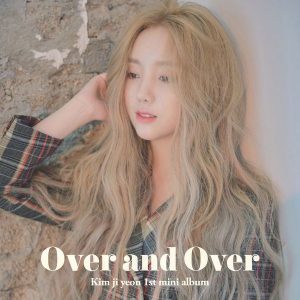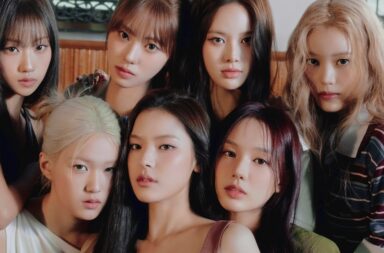
Making her solo debut almost five years after the debut of her group Lovelyz, Kei has released her first mini-album Over and Over. Released on October 18, the mini-album has 6 songs that depict the various stages of love. The album cover is elegant in its simplicity, featuring Kei staring wistfully to the side. Interestingly, the cover credits the album to Kim Ji-yeon (Kei’s real name) rather than her stage name. Kei explained in a press conference that she made the decision to release the mini-album as Kim Ji-yeon (Kei) in order to raise awareness about her solo career without letting go of her beloved stage name.
Despite Lovelyz debuting all the way back in 2014, Kei is the first member of the group to debut as a soloist. She shared that she hopes her solo debut goes well so other members get a similar chance in the future. Thematically, the album centres around love and heartbreak. Kei plays the part of a young girl who experiences each stage of love intensely as the album progresses.
The title track of the album is “I Go,” which establishes the album’s theme and begins Kei’s journey towards finding love. The aesthetic of the music video is heavily-inspired by Alice in Wonderland, it begins with Kei surrounded by clocks in the middle of a lush forest and continues in this vein. Kei’s styling in the music video is worth noting as she sports blonde hair and is without her signature bangs. According to Kei, her transformation is a deliberate attempt to give herself a more mature aura to better suit the theme of the album.
As the video continues, the lights dim and Kei is transported to an open field through a magical door. She radiates a bright light, which as the lyrics imply, grows stronger as she gets closer to finding her love. The open field and Kei’s white outfit lend her an angelic aura which is fitting as the song is about a purer form of love. Throughout her journey, Kei summons an aurora borealis by playing the piano and lights up an entire forest with her touch, further driving home that she is an Alice-like character in an unfamiliar world. The video concludes when Kei fixes her stopwatch with parts she finds. This is likely a metaphor for Kei finally finding her love. Both the music video and the song are effective in displaying Kei’s growth as an artist.
Speaking of the song, “I Go” is a piano-driven song sprinkled with just a touch of EDM to make it more palatable to a pop audience. Lyrically, Kei sings about growing stronger as she gets closer to finding love. The pre-chorus is a gradual build-up which culminates in a powerful chorus from Kei. With the chorus, the full range of Kei’s vocal talent is on display. As the chorus progresses, a bouncy synth progression is injected to give the track some energy. Comparing this Kei to the one who sang “Candy Jelly Love” five years ago is like night and day; she is now a much more accomplished vocalist. Remarkably, “I Go” is far from being Kei’s best performance on the album.
That honour belongs to “Cry” which also holds the title of being the album’s most melancholic track. It is musically in-line with the rest of the album, focusing heavily on string instruments and the piano. However, the most thrilling part of the track is Kei’s vocals which are sombre yet powerful as she weeps for a lost love. The English line “Cry, Cry,” which repeats during the chorus, sparks a sadness that is almost vibrant in its severity.

With “I Go” and “Cry,” Kei is demonstrating two opposite emotions and as a result, has to vary the emotion in her vocals to suit the song. Kei doing this impressively, considering she has rarely had to do it in the past. The majority of Lovelyz’s discography is made up of energetic, upbeat, and charming songs, with little room left for significant variation. With Over and Over, Kei has established herself as a capable ballad singer who can explore a range of emotions with her music. Thematically, the songs are similar but their execution required nuance and Kei was successful in achieving such an effect.
“Paper Moon” and “Dreaming” both tell a similar story, one of a nervous love that is fleeting yet beautiful. The latter is sure to be a fan favourite with its catchy chorus and its subtle use of drums to give the song more kick. Kei sings frantically following the first chorus, almost invoking a feeling of urgency in the listener as she hurtles towards the next verse. The former is a much more relaxed take on the same concept. Kei rarely elevates to a higher pitch during “Paper Moon” as she calmly sings about a love that is resplendent under the moonlight but gone at dawn. Both songs are well mixed and allow Kei to show off the extent of her vocal ability in a way which engages and charms the listener.
The mini-album ends with “This Rain,” a song about recovering from a past love. Poetically, the album begins with finding love and ends with overcoming heartbreak. However, this song almost feels like a filler as Kei once again sings morosely over a piano-heavy backing track. It matches with the rest of the album almost too well, making it forgettable amongst the other more memorable tracks.
Overall, the mini-album succeeds in its goals. It establishes Kei as an adept vocalist capable of performing as a soloist. Through this, it also displays how much Kei has grown since her debut. Over and Over is by no means experimental or groundbreaking, and Woolim did not take many risks in its production. It is an album that suits Kei’s talents very well and is generally pleasing to listen to. With this album, Kei successfully transitions from Lovelyz’s “aegyo pill” to a capable and powerful vocalist in her own right. With Over and Over, Kei has become Kim Ji-yeon, just as she intended.


